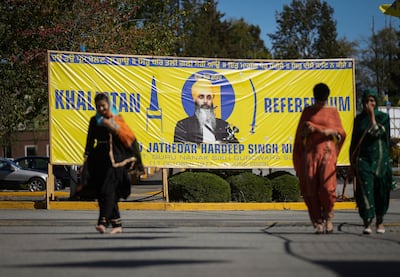India rejected Canadian Prime Minister Justin Trudeau’s claim that New Delhi played a role in the killing of Sikh separatist Hardeep Singh Nijjar and expelled a Canadian diplomat in retaliation on Tuesday.
Mr Nijjar, 46, was leader of the Khalistan Tiger Force and was designated as a terrorist by India in 2020. He was shot dead in his vehicle outside a Sikh temple in Surrey, British Columbia, in June.
His killers have not been identified.
Mr Trudeau told the Canadian Parliament on Monday that there were “potential links between agents of the Indian government” and Mr Nijjar’s killing.
“Any involvement of a foreign government in the killing of a Canadian citizen on Canadian soil is an unacceptable violation of our sovereignty,” he said.
The Canadian Foreign Ministry said it had expelled a senior Indian diplomat, said to be the head of India's intelligence operations in Canada. The name of the individual was not made public.
India on Tuesday expressed “deep concerns” over the Canadian government’s sympathies for Mr Nijjar.
“We have seen and reject the statement of the Canadian Prime Minister in their parliament, as also the statement by their Foreign Minister. Allegations of the government of India's involvement in any act of violence in Canada are absurd and motivated,” the Ministry of External Affairs said.
“Such unsubstantiated allegations seek to shift the focus from Khalistani terrorists and extremists, who have been provided shelter in Canada and continue to threaten India’s sovereignty and territorial integrity. The inaction of the Canadian government on this matter has been a long-standing and continuing concern.”
The ministry said a senior Canadian diplomat had been ordered to leave the country "within five days".
"The decision reflects Government of India's growing concern at the interference of Canadian diplomats in our internal matters and their involvement in anti-India activities," it said.

New Delhi has urged the Canadian government to take action against all anti-India elements on its soil.
“The space given in Canada to a range of illegal activities including murders, human trafficking and organised crime is not new. We reject any attempts to connect the Government of India to such developments,” the ministry said.
India's northern state of Punjab has struggled with a decades-old secessionist movement seeking the creation of a homeland called Khalistan for Sikhs, a religious minority of about 24 million people.
Tens of thousands of civilians, militants and Indian security personnel were killed in the insurgency, which peaked in the early 1980s and has since declined.
The movement has remained active in the state through sleeper cells.
India has accused secessionist groups and leaders based overseas – especially in Canada, Australia and the UK – of funding and supporting Punjab's independence movement.
Mr Nijjar, from Jalandhar district in Punjab, moved to Canada in 1997, where he worked as a plumber. He led the governing body of the temple where he was shot since 2020.
India’s National Investigation Agency charged Mr Nijjar with being part of a conspiracy to commit terrorist acts, and his name was on a wanted list given to Mr Trudeau in 2018 during a visit by the head of the Punjab state government at the time.
He was also accused of conspiring to create an atmosphere of fear and lawlessness and inciting people to rebel against the Indian government during the year-long protests by farmers against controversial farm laws in 2020.
He was also associated with Sikhs for Justice, a banned separatist organisation in India.


